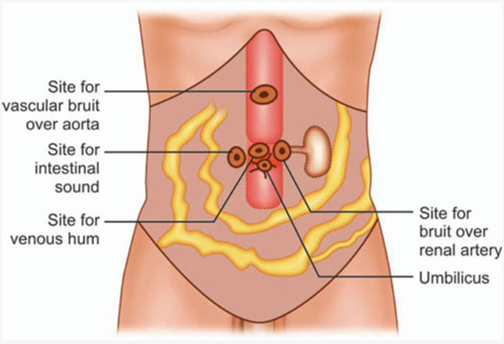The nurse is admitting a client with Abdominal aortic aneurysm. Which assessment data would support the diagnosis?
Shortness of breath.
Abdominal bruit.
Ripping abdominal pain.
Decreased urinary output.
The Correct Answer is B
A bruit is a sound that can be heard with a stethoscope when blood flows through a narrowed or damaged artery. An abdominal bruit may indicate an abdominal aortic aneurysm (AAA), which is a bulge or swelling in the main blood vessel that runs from the heart down through the chest and tummy.
Shortness of breath is a common symptom of many conditions, but it is not specific to AAA. It can be caused by heart or lung problems, anemia, anxiety, lack of exercise, obesity, and many other factors. Shortness of breath may occur with a ruptured AAA, but it is not a reliable sign of an intact AAA.
Ripping abdominal pain is a severe and sudden pain that may indicate a ruptured AAA, which is a life-threatening situation that requires immediate medical attention. However, an intact AAA usually does not cause any pain or discomfort. Therefore, ripping abdominal pain is not a good indicator of an AAA diagnosis.
Decreased urinary output is a sign of reduced kidney function, which can have many causes such as dehydration, kidney failure, urinary tract obstruction, or medication side effects. Decreased urinary output is not directly related to AAA, although it may occur as a complication of a ruptured AAA or surgery to repair an AAA.

Nursing Test Bank
Naxlex Comprehensive Predictor Exams
Related Questions
Correct Answer is C
Explanation
The most important finding to report to the health care provider would be the serum potassium level of 3.0 mEq. This is an extremely low potassium level (normal range is typically 3.5-5.0 mEq/L), which can indicate a potentially life-threatening condition called hypokalemia. Furosemide (Lasix) is a diuretic medication that can cause potassium loss in the urine, and a low potassium level can lead to serious cardiac and muscle abnormalities. It is crucial to report this finding promptly to the health care provider for appropriate intervention and monitoring.
Blood glucose level of 175 mg/dL: While an elevated blood glucose level can be a concern, especially for individuals with diabetes, it is not the most critical finding in this situation. The client's primary concern is hypertension, and the administration of IV furosemide is aimed at managing blood pressure. The elevated blood glucose level should still be addressed and monitored, but it is not as urgent as the low potassium level.
Orthostatic systolic BP decrease of 12 mm Hg: Orthostatic hypotension refers to a significant decrease in blood pressure upon standing up. While it is important to assess and manage orthostatic changes, a decrease of 12 mm Hg in systolic blood pressure alone may not be considered clinically significant. It could be a normal response for some individuals. However, if the client experiences symptoms such as dizziness or lightheadedness upon standing, further evaluation may be necessary. Nonetheless, it is not as urgent as the low potassium level.
Current blood pressure reading of 166/94 mm Hg: While this blood pressure reading indicates hypertension, it is not the most critical finding to report in this situation. The nurse is preparing to administer furosemide (Lasix), which is a medication commonly used to treat hypertension. It is expected that the blood pressure will be high before administering the medication. The goal is to monitor the blood pressure after the administration to assess the effectiveness of the medication.
Correct Answer is C
Explanation
The inability to move the left arm and leg suggests a neurological deficit, which is a significant finding that requires immediate attention. It could indicate a potential stroke or another neurological emergency that requires prompt evaluation and intervention. The health care provider needs to be notified immediately so that appropriate diagnostic tests and interventions can be initiated.
Tremors in the fingers when extending the arms can be a sign of tremor disorders or medication side effects but may not warrant immediate intervention.
Atrial fibrillation is a cardiac arrhythmia that requires monitoring and management but may not be directly related to the acute neurological issue.
The headache reported by the patient, although significant, is subjective and may be related to the hypertensive emergency or other factors but does not require immediate intervention compared to the potential neurological deficit.
Whether you are a student looking to ace your exams or a practicing nurse seeking to enhance your expertise , our nursing education contents will empower you with the confidence and competence to make a difference in the lives of patients and become a respected leader in the healthcare field.
Visit Naxlex, invest in your future and unlock endless possibilities with our unparalleled nursing education contents today
Report Wrong Answer on the Current Question
Do you disagree with the answer? If yes, what is your expected answer? Explain.
Kindly be descriptive with the issue you are facing.
